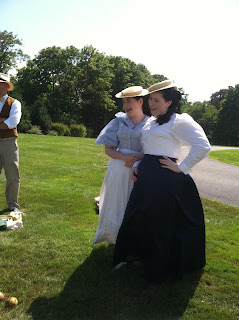It's been a rough few months (year? year plus?) for me for sewing. But I've been doing a lot of vintage knitting! Occasionally, I will even finish a project. And here is project I'm pretty crazy proud of - a reproduction of a designer 1920s sweater. And because this post ended up being so long, here's a quick picture in case you don't make it any further.
 |
| Taken outside Longfellow House, during a break in a tweed ride. Check out that sweater!!! |
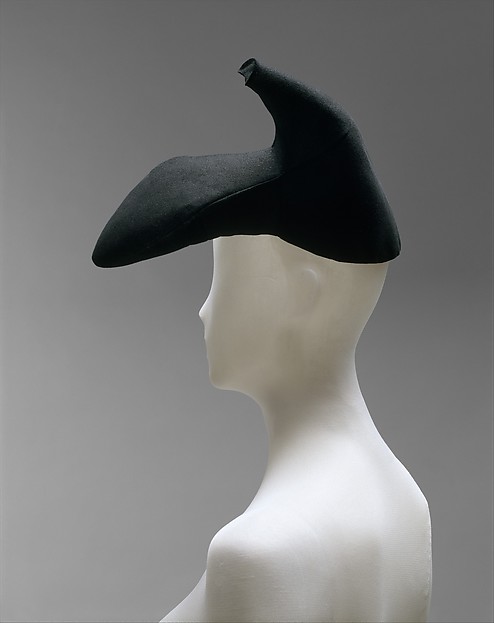 |
| These are both from the Metropolitan Museum of Art. |
 |
| The V&A owns this one, and the Philadelphia Museum of art has one too, but they can keep them! I made my own! |
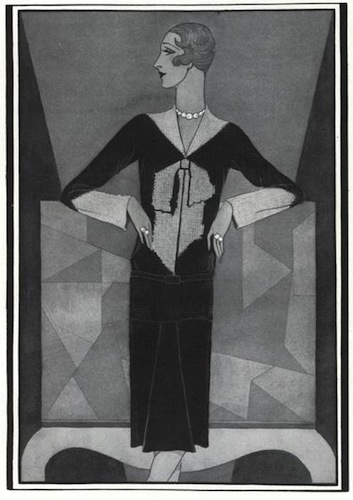 |
| Here it is in Vogue! |
The story goes that Schiaparelli saw an Armenian woman walking down the street in a sweater that had a "steady look," which came from the extra thickness and stability of this technique. If you imagine the 1920s, sweaters were a sporty and newly popular item for women's wear, but apparently they had a problem holding their shape. The combination of this special knitting technique and Schiaparelli's snazzy trompe l'oeil bow made this sweater unlike anything else that was available. It is an iconic 1920s fashion revolution. (https://www.philamuseum.org/doc_downloads/education/ex_resources/schiaparelli.pdf)
And now that you understand the importance of this sweater, here is mine!
 |
| LOOK AT THAT BOW |
 |
| Fake sailor collar! Nice. |
So, what do you think? And do you want your own? Good news - you can do it!
If you can knit, this is the pattern I used:
http://reelknitting.typepad.com/index/2009/06/free-pattern-the-schiaparelli-bowknot-sweater.html
Have at it. The good news is that the chart is fantastic, and I'm really pleased with how the bow looks. This is not just a Schiaparelli-like sweater, this is recognizable as a reproduction. A copy. Unquestionably 1920s. The bad news is that it's only for a 34 inch bust, which I am not, and it calls for expensive yarn that I didn't want to source from the UK. For my sweater, I compromised and used the chart, but ignored the instructions. I wanted to use real wool (rather than acrylic or something), because I thought it might matter in terms of how the front and back threads interact, because wool is less slippery. Also there's something legitimate about using real wool. That doesn't mean I used expensive wool, though - just cheap Patons from Michaels. I tried to find more serious yarn, but had trouble finding anything in an appropriate gauge, in both black and white, that wouldn't cost well over $100 to finish the sweater. And in the end, I used a lot - I wish I'd kept track, but I think I needed 6 skeins of black and 5 of white? This is a HEAVY sweater. It's big (in what I hope is a shapeless hanging 1920s way), and it's heavy (in a 2 layers thick, wear this sweater on cold days and skip the coat way).
In terms of process, I started by knitting a healthy swatch for gauge (a few times on different sizes of needles - I ended up using a size 8), then did the math to make sure it would go around my bust. Since I wanted a 1920s, sort of shapeless and straight looking sweater (if it weren't for the 1920s I'd rather have something more fitted and curvy) I aimed big. I used worsted weight yarn, even though the pattern definitely called for something finer. I'm sure the originals were made with something finer, but I also think that they were made with many more stitches per inch. So I don't recommend doing that unless you want to re-graph the whole pattern to make it human sized again. That's more work than I wanted to do. The Armenian knitting technique grew on me, and it was important to me to try it because it is such a critical part of what makes this sweater special in its historical context. But it was kind of a pain, and if you know intarsia I wouldn't fault you for using the chart to do that instead.
Besides, if I were going to do the work of charting a design, I'd make this one. Because it is my favorite! Isn't it gorgeous? Oh, I hope I make it someday...
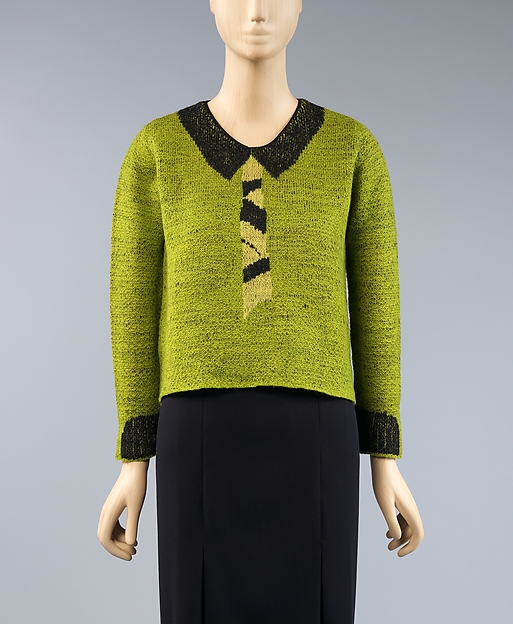 |
| The Met also owns this one. But if they ever get tired of it I could take it off their hands... |
http://www.rookiemag.com/2012/09/how-to-fake-your-own-schiaparelli-sweater/
Or if you're not feeling crafty at all, shop carefully and you just might find a perfect sweater anyway. This is an iconic sweater from fashion history, and it still inspires designers today. I keep seeing this one, by J Crew, turn up on ebay!
And this is one of my favorite things about this sweater. It might be a little odd if you make one and we happen show up to the same event in them, sure, but this was an early piece of semi-mass-produced clothing. There are original Worth dresses in museums that I'd kill to wear and love to copy exactly, but I'd always feel a little odd wearing them, because they were one of a kind and mine isn't the one. Don't get me wrong, if you make exact copies of museum-owned dresses that's super cool. But if I lived in the 1920s, I could (maybe sorta if I was lucky) have bought one of Elsa Schiaparelli's sweaters. There wasn't one sweater for a fashion show or a particular rich client, there were dozens made to sell. So making my own now and wearing it to 1920s events just feels right to me, somehow. If I can stand the heat, anyway, because it turned out to be so warm!

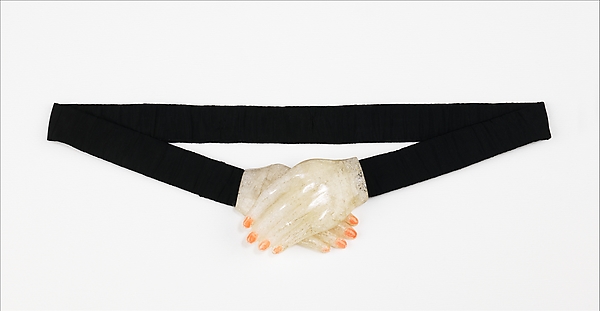









.jpg)






